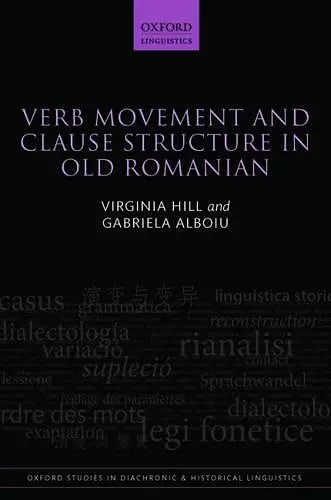Verb Movement and Clause Structure in Old Romanian
Virginia Hill author Gabriela Alboiu author
Format:Hardback
Publisher:Oxford University Press
Published:21st Jan '16
Currently unavailable, and unfortunately no date known when it will be back

The book provides a formal analysis of root and complement clauses in Old Romanian. Virginia Hill and Gabriela Alboiu examine the combination of Balkan syntactic patterns such as generalized subjunctive complementation on the one hand, and the Romance morphology that supplies complementizers and grammatical mood forms on the other. The consequences of this mixed typology range from root clauses with non-finite verbs to split heads and repeated recycling in clausal complements. The book argues that discourse triggers at the left periphery are responsible for fluctuations in verb movement in finite clauses, while with gerunds and imperatives verb movement follows from functional constraints. It further argues that clausal complements to control and raising verbs systematically display the pattern of the Balkan subjunctive, and that the spell out of these clausal complements has been repeatedly recycled during the development of Romanian. Verb Movement and Clause Structure in Old Romanian presents a new perspective on the manifestation of Balkan Sprachbund properties in the language, and on the nature of parametric differences in relation to other Romance languages. It provides a unified explanation for a range of constructions that have previously been treated as separate phenomena, and places diachronic changes in Romanian in a wider context.
This book focuses on a stage in the history of the language that has not benefited so far from a thorough investigation within a formal theoretical framework. It is extremely valuable both in terms of its empirical coverage but also in terms of the subtlety with which the analysis captures unifying patterns for some Old Romanian facts that would otherwise seem disconnected. * Prof. Dr Marius Sala, Iorgu Iordan-Alexandru Rosetti Institute of Linguistics, Bucharest *
In this most interesting and well-researched work, authors Hill and Alboiu apply the techniques of historical generative syntax to a knotty problem in the synchronic syntax of Old Romanian with an eye as well to the diachronic syntax of Romanian more generally. This not only is a contribution to historical syntactic studies but it also enriches our understanding of a key, and often overlooked, member of the Romance language group. * Brian D. Joseph, The Ohio State University *
This data-rich, diachronic investigation of changes from Old to Modern Romanian provides a fascinating record of verb-movement and challenges some earlier views of the architecture of the clause, the expression of mood, and the structure of complementation. The book also asks questions about why certain languages are the way they are and how they each display certain cycles of change. The framework is cartographic, with sophisticated yet accessible argumentation, well-glossed examples and transparent trees. This book is highly recommended for its empirical coverage and theoretical insights. * Elly van Gelderen, Arizona State University *
recommend the book to linguists of any theoretical persuasion interested in Balkan linguistics, diachronic variation and the syntax of control structures. * Giuliana Giusti, Diachronica *
ISBN: 9780198736509
Dimensions: 234mm x 166mm x 25mm
Weight: 644g
352 pages